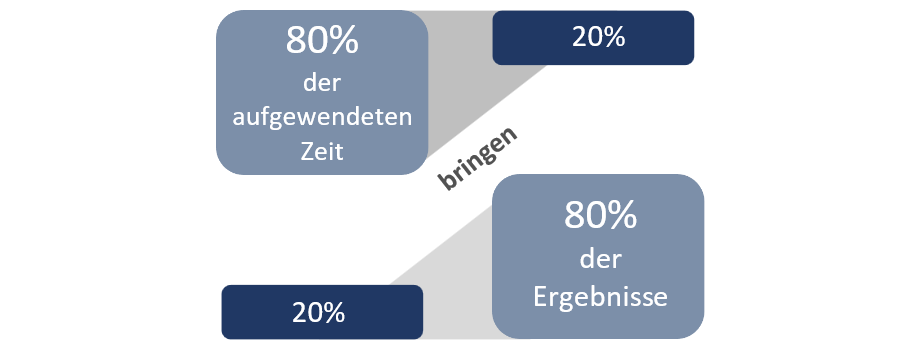The Pareto Principle
Work more efficiently in time-critical situations with the 80/20 rule!

The Pareto Principle was named after an Italian economist, engineer, and sociologist named Vilfredo Pareto. The Pareto principle is a well-known time management method and is also known as the 80/20 rule. It states that 80% of the result can be achieved with only 20% of the total effort.
Time is a valuable commodity these days. Whether private or professional, everyone tries to get as much done as possible in the shortest possible time. At the same time, it can happen at work that you “waste” too much time on a task that is ultimately not decisive for the respective success. The Pareto principle helps to counteract this.


The Pareto principle is illustrated below using examples in different situations:
Examples
Sales: In some companies it happens that 20% of the employees generate 80% of the total sales.
Warehouse: Most of the time, 20% of the products take up 80% of the storage space.
Everyday life: Many people's wardrobes are overflowing with clothes. Yet most people only wear 20% of their clothes 80% of the days of the year.
Household: Imagine your parents are coming to visit in an hour. Since the last few days have been stressful, you haven't had time for a thorough house cleaning. This would take several hours. You decide to put the clothes lying around in the laundry basket, load the dishwasher and vacuum. Your apartment now looks clean and tidy at first glance. So you have done 80% of the housework in a short time. Your visit can come!
Time Management: When creating a presentation, the content is complete 20% of the time. The niceties like spelling corrections, graphics, animations, etc. would take up most of the time. In time-critical situations, however, these subtleties may not be absolutely necessary, so that they can be partially or completely dispensed with.
The Pareto Principle In A Seminar Context
The Pareto principle can also be taken into account very well when planning seminars. It reminds you not to linger too long on detailed questions, but to concentrate on the most important things.
Conclusion
The Pareto principle is a useful and sensible tool to save energy and time in order to achieve a lot with little effort. However, it is not a template to lazily serve your time in the office without a guilty conscience. The 80/20 rule only serves as an aid - especially in time-critical situations - to work efficiently and success-oriented. It also promotes meaningful prioritization of tasks. This applies to private and professional alike.